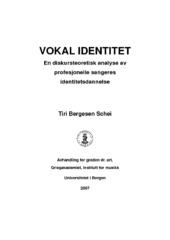Vokal identitet En diskursteoretisk analyse av profesjonelle sangeres identitetsdannelse
Doctoral thesis
Permanent lenke
https://hdl.handle.net/1956/2549Utgivelsesdato
2007-12-14Metadata
Vis full innførselSamlinger
Sammendrag
The main focus of the dissertation is identity formation. Three Norwegian professional singers within classical, pop, and jazz music, respectively, have been interviewed about their thoughts on becoming and being singers. What challenges does the stage pose? What are the demands of perfection that mould singers’ practices? How are they governed by cultural norms embedded in vocal ideals, voice genres, educational concerns, conceptions of normality and common sense? What possibilities and limitations for independent vocal expression and creation exist within classical, pop and jazz singing? The design of the dissertation lies within a Foucault-oriented discourse theoretical perspective. Concepts like “discursive space”, “governmentality”, “self-technologies” and “subject positions” are among the tools used for analysing vocal identity. The main concept is self-technology which can be understood as a disciplinary technique that the individual applies to him/herself in order to be more competent. Self-technologies are practices that are constituted when an individual submits to the discursive logic that constructs an individual’s perceptions of what is normal, true and correct. When the informants describe their professions, they talk about self-technologies, the practices through which they identitate. The neologism identitation designates the ongoing, unfinished and complex processes that create, confirm and renew a person’s identities. Identitaton is to be, to have and to seek identity(ies). The study shows that genre is critical for vocal identitation by structuring the discursive rooms where singers’ professionalism is confirmed and corrected. Even though discursive spaces change over time, they structure the conventions that delimit the range of possibilities within which a subject has to position him/herself, and hence to identitate. Singers are offered subject positions through the circulating discourses of the vocal cultural room, the cultural field where singers develop, interact and perform their art. The singer can actively influence his/her life as a professional singer if s/he acknowledges the normative pressure from institutions, curricula, media, colleagues and audiences. Through reflecting on his/her own practice and identitation processes, s/he may actively choose goals, strategies and self-technologies within the vocal cultural room. Such awareness of choice may lead to playful, critical and bold identitation, and thereby contribute to the development and change of dominant vocal discourses. The study shows that the singers, despite classifying themselves in different genres, experience the same demands, practice common self-technologies, and are regulated in part by the same discourses. The three singers are all influenced by the central ideals of the classical vocal discourse. The analysis indicates that classical singing maintains a hegemonic position among professional singers. When singers, through identitation, come to embody cultural norms, this represents an important canalization of power.
Utgiver
The University of BergenOpphavsrett
All rights reservedTiri Bergesen Schei
